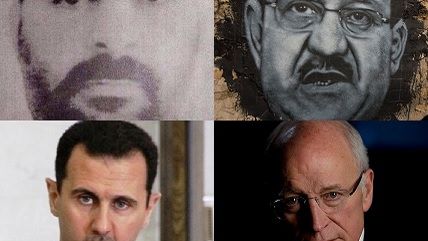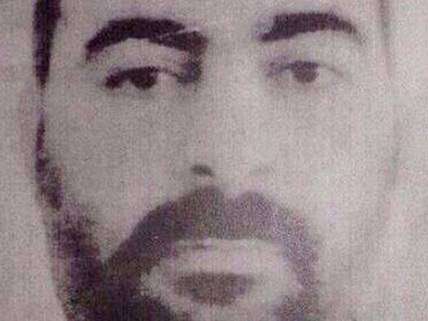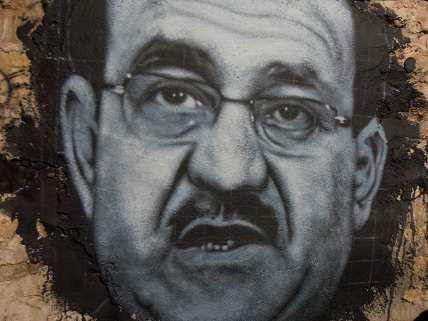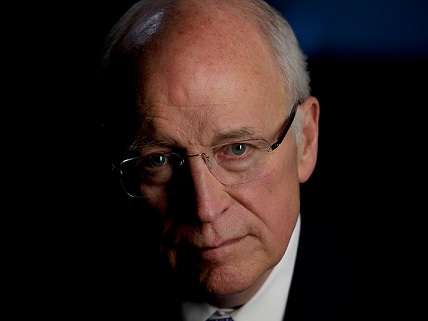Four People to Blame for the Crisis in Iraq
Failure's no orphan

For Iraq, June has been the cruelest month. The jihadist group Islamic State in Iraq and Syria (ISIS) has made incredible gains in Iraq. On June 5, ISIS fighters briefly seized Samarra before being pushed back by Iraqi government forces. On June 10, ISIS seized Iraq's "second city," Mosul, on the crossroads between Iraq and Syria, another area of operations for ISIS. On June 15, ISIS claimed to have captured and killed 1,700 Iraqi soldiers in Tal Afar. A few days later they attacked a major oil refinery north of Baghdad, one that was responsible for about 25 percent of the country's domestic oil consumption. As Iraq verges on the brink of civil war, there's a cornucopia of Iraqi and foreign figures who could be blamed for the unfolding disaster. Here are four:
1. Abu Bakr al-Baghdadi

Abu Bakr al-Baghdadi—not his real name—is the leader of the Islamic State in Iraq and Syria, and as such, the primary blame for the crisis ISIS has precipitated in Iraq lies with him. Al-Baghdadi may have been a cleric in Samarra when the U.S. invaded in 2003 and according to a BBC report, he may have already been a radical then, or he may have been radicalized while spending four years at a U.S.-run prison for Al Qaeda commanders in Iraq. Al-Baghdadi became the leader of Al Qaeda in Iraq, one of the organizations that evolved into ISIS, in 2010. Al-Baghdadi has avoided the spotlight, unlike his predecessor, Abu Musab Al-Zarqawi, a showman who was eventually traced down and killed by the U.S. in 2006. While ISIS may be linked to Al Qaeda, it has not been a subordinate. At The Washington Post, David Ignatius reported that ISIS was "so toxic that it's disowned by Al Qaeda and is feuding with Al Qaeda leader Ayman al-Zawahiri." Al-Baghdadi is apparently even poaching jihadists from other Al Qaeda affiliates, including those in Yemen and Somalia.
2. Nouri al-Maliki

Nouri al-Maliki has been the prime minister of Iraq since first being elected in 2006. He won re-election narrowly in 2010—his party finished second but he managed to cobble together a governing coalition—and in 2011 he promised not to run again. "Eight years is enough for him, in order to not convert to a dictatorship," his media advisor told the Associated Press. He promised, too, that al-Maliki would back a constitutional amendment limiting prime ministers to two terms. Eventually, al-Maliki's opponents passed a term limit law, opposed by al-Maliki and rejected by the Iraqi Supreme Court as unconstitutional. Since then, al-Maliki has arguably been at work converting his rule into a dictatorship. He has been accused of numerous human rights abuses, and an incident last April in which he sent military forces to target Sunni protestors (al-Maliki and his ruling party is mainly Shi'ite) may have provided the opportunity for ISIS to scale up and expand its militant campaign.
A Congressional Research Service (CRS) report issued earlier this month (PDF) described the April 2013 incident. Three days after the beginning of that year's provincial elections, al-Maliki sent Iraqi security forces to a protest camp established by Sunnis in Hawijauh. The CRS report claimed that after this incident, "many Sunni demonstrators and tribal leaders took up arms and called on followers to arm themselves," that some Sunni gunmen took over government buildings in another town, and that Iraqiyya, a majority Sunni political party, pulled out of Iraq' national legislature. According to the CRS report, U.S. officials urged al-Maliki not to use the military to crack down on Sunni protestors because "such a strategy has led to all-out civil war in neighboring Syria" and that al-Maliki should instead work with Sunni tribal leaders to de-escalate the situation.
There are signs, too, that the Iraqi population that has found itself living in territory controlled by ISIS. One Vice correspondent in Iraq reports that in Mosul ISIS has found some support among local residents, who say life is calmer under the jihadi group and that the jihadists' strict interpretation of Islam has not yet been imposed. One Sunni resident told Vice that the takeover of Mosul by ISIS was "an uprising against the tyranny of Maliki." While in Iraq this week, Kerry uged Maliki to form an inclusive government. Two months after being re-elected to a third term he promised not to seek, al-Maliki has yet to form a governing coalition.
3. Bashar Assad

Bashar Assad has been the president of Syria since his father, who was also president of Syria, died in 2000. Three years ago, anti-government protests in Syria erupted, the tail end of a string of regional protests dubbed the "Arab Spring." Those protests eventually saw the overthrow of long-time heads of state in Egypt, Tunisia, and Libya, the last of which was aided by a U.S.-backed intervention. In Syria, 5,000 people had been killed in government violence by the end of 2011. What began as a pro-democracy protest movement had by then turned into a civil war, with army deserters forming the Free Syrian Army, one of the first of many rebel groups to operate in Syria since then. As it had been in Libya, whose protests too turned into a protracted civil war, the fight was joined by more radical groups. At the beginning of 2012, the Al-Nusra front, eventually identified as an Al Qaeda affiliate, had established itself in the country. Opposition activists at the time blamed some of the terrorist activity on false-flag operations by the government, while the government blamed Al Qaeda. By 2013, the Islamic State of Iraq, which evolved into ISIS, was also operating in Syria, targeting moderate rebels.
Assad had been promising democratic reforms in Syria for years but not acting on it. His response to anti-government protests in his country involved acts like beating up a political cartoonist critical of the regime. His decided to treat the protests as a military problem and used the military to solve it, which had the effect of turning the protests militant and allowing jihadist groups to enter the fray. The Islamic State of Iraq largely became ISIS (the Islamic State in Iraq and Levant) because of the opportunity presented by Assad's war of choice in his own country to take their fight there, something not even Al Qaeda seemed to want. When al-Baghdadi announced the Islamic State of Iraq and al-Nusra were merging, al-Nusra denied it, reconfirming its commitment to Al Qaeda, while Al Qaeda leader Ayman al-Zawahiri "ruled" that al-Baghdadi and the Islamic State of Iraq remain there.
4. Dick Cheney

Last weekend, Sen. Rand Paul (R-Ky.) said he couldn't blame the crisis in Iraq on President Barack Obama. On the other hand, he said he blamed the unrest in the region on the Iraq War. Indeed, the U.S. war in Iraq, and the chaos created by the overthrow of the Hussein regime and the dismantling of the Baath government, is the reason Al Qaeda was able to establish itself in Iraq and the region. Dick Cheney, when he was secretary of defense under President George H.W. Bush, understood that marching U.S. troops into Baghdad during the First Gulf War would be a "bad idea," as he explained in a 1994 C-SPAN interview. "Once you got to Iraq and took it over, took down Saddam Hussein's government, then what are you going to put in its place?" he asked. "That's a very volatile part of the world." His main fear was the volatility would see Iraq carved up by neighbors like Syria and Iran. What changed between then and the U.S. invasion in 2003? Certainly none of the facts on the ground in the region. Instead, the only thing that changed was 9/11 and its use in policy and decision-making to suspend rational thought.
In the 1990s Dick Cheney understood invading Iraq would be a quagmire. He became George W. Bush's vice president after leading the search committee in 2000 for Bush to find his running mate. President Bush said he chose him because of his vast experience (his career at the White House began as an assistant to President Gerald Ford; he was eventually his chief of staff) and the insight he could provide on issues Bush's time as governor of Texas didn't give him experience in. Among the most important of these were foreign policy issues. In 2000, Bush ran on a platform of no nation-building. The fundamentals that made that good policy remained after 9/11 but, driven by Dick Cheney's idea that the war on terror would last a lifetime, were ignored, to disastrous result. More than 12 years after entering Afghanistan the nation-building project is a disaster—97 percent of the country's GDP is foreign spending, both military and humanitarian. Less than three years after leaving Iraq the nation-building project there is looking similarly doomed, something Dick Cheney circa 1994 knew would happen.


Show Comments (29)